|

Max Pechstein
_______________________
The Ballad of the Bone Boat
(Meditation Three)
Allen Grossman (1932-2014)
I dreamed I sailed alone
In a long boat, a white bone;
Like a strong thought, or a right name
The sail had no seam.
The mast, and its shadow on the sea,
Fled like one high lonely tree
Bent with the weight of the wind-fruit sown
By the cold storm.
It was a dream of dignity
When I steered on that plated sea
With a seamless sail, and a boat like a bone,
In a fair time of the moon.
There was no rudder in the long bone boat,
The compass was a stone –
The air was empty of the deep sea gull,
And gone was the cry of the loon.
The sea and the sky were one dark thing,
The eye and the hand as cold.
Unbound was my hair, unbound was my dress;
Nothing beckoned or called
But the words of a song
That had death in its tune
And death in its changes and close –
A song which I sang in the eye of the moon,
And a secret name that I chose.
And this is the song: “Straight is the way
When the compass is a stone,
And the sail has no seam, and the boat is a bone,
And the mast is bent like a tree that bears
The wind-fruit of the moon.”
And now I sing, O come with me,
And be at last alone;
For straight is the way in the dream of the boat
That is a long white bone.
_______________________

Landscape in North Wales
1938
Stanley Spencer
b. June 30, 1891
_______________________
Stanley Spencer (Scraps)
John Latta
Isola Di Rifiuti
Guy Davenport, out of "Stanley Spencer and David Jones":
How, then . . . to see Spencer? . . . Is he a mystic descending from the heaven-on-earth designers (St.-Simon, Fourier, Mother Ann Lee) with a hope for political reformation? Clearly, his sexual paintings constitute a critique of society as we know it, comically different from D. H. Lawrence's, Ibsen's, or the yeastier psychoanalysts with bees in their bonnets about a society without repressions. Not even Fourier, that most imaginative of Utopians, considered orgies with sunflowers and dogs. A plausible answer might be that he is a disillusioned visionary. Apolitical, but a democrat in the philosophical sense, eccentrically religious, honest, a realist in matters of the flesh, Stanley Spencer was before all else a poet for whom the natural beauty of the world-meadows, gardens, trees in blossom, rivers-was the primary fact.
_______________________
The elements will writhe around him. The elements buckle and break and twist.
Nietzsche and the Burbs
_______________________
I sing that graceful toy, whose waving play,
With gentle gales relieves the sultry day.
Not the wide fan by Persian dames display'd,
Which o'er their beauty casts a grateful shade;
Nor that long known in China's artful land,
Which, while it cools the face, fatigues the hand;
Nor shall the muse in Asian climates rove,
To seek in Indostan some spicy grove,
Where stretch'd at ease the panting lady lies,
To shun the fervour of meridian skies,
While sweating slaves catch every breeze of air,
And with wide-spreading fans refresh the fair;
No busy gnats her pleasing dreams molest,
Inflame her cheek, or ravage o'er her breast,
But artificial zephyrs round her fly,
And mitigate the fever of the sky.
John Gay (b. June 30, 1685) from The Fan
_______________________

Southwold Beach
Stanley Spencer
1937
_______________________
Dust
Allen Grossman
(Ars Poetica)
This is Spring for the last time. And poetry
Is dead — as when the Great Mind of the world
Or the mind in fact of the one man or woman
Among us who can speak has suppressed a momentous
Theme and nothing comes to mind in its place
And nothing is heard and nothing is seen
And the field is empty. Or it is like
An old ballad written down, or foot prints
Under the ice of time: the trace of one
Foot fall and in that print another print
Of foot falling and perished in the air
(And thus began the motive of our endless
Patience — the waiting for the sound a thousand years
Of the one foot fall and to hear it again
To hear it is the reason of our art
By which the greatest poet makes the deepest silence
In the empty heart of the strongest song);
But in earth remained the writing of the path
Of two — human, or partly human — who were
Walking on a bare flat plain at the dark hour
The far mountain threw down this dust. ...
...(more)
_______________________
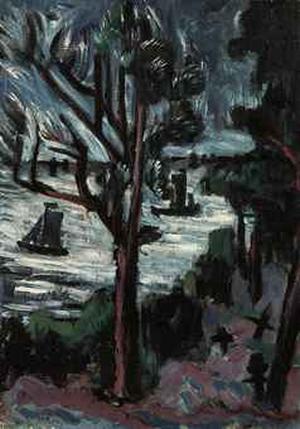
Max Pechstein
d. June 29, 1955
_______________________
Descartes' Loneliness
(Meditation Three)
Allen Grossman
Toward evening, the natural light becomes
Intelligent and answers, without demur:
“Be assured! You are not alone. . . .”
But in fact, toward evening, I am not
Convinced there is any other except myself
To whom existence necessarily pertains.
I also interrogate myself to discover
Whether I myself possess any power
By which I can bring it about that I,
Who now am, shall exist another moment.
Because I am mostly a thinking thing
And because this precise question is
Only from that thoughtful part of myself,
If such a power did reside within me
I should, I am sure, be conscious of it. . . .
But I am conscious of no such power.
And yet, if I myself cannot be
The cause of that assurance, surely
It is necessary to conclude that
I am not alone in the world. There is
some other who is the cause of that idea.
But if, at last, no such other can be
found toward evening, do I really have
sufficient assurance of the existence
or of any other being at all? For,
after a most careful search, I have been
unable to discover the ground of that
conviction – unless it be imagined a lonely
workman on a dizzy scaffold unfolds
a sign at evening and puts his mark to it.
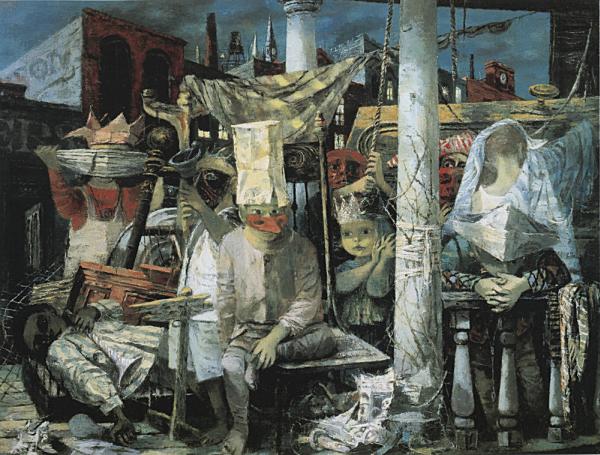
If This Be Not I
1945
Philip Guston
b. June 27, 1913
_______________________
The Philosopher, the Drunk, and the Lamppost
R. Scott Bakker
Three Pound Brain
A crucial variable of interest is the accuracy of metacognitive reports with respect to their object-level targets: in other words, how well do we know our own minds? We now understand metacognition to be under segregated neural control, a conclusion that might have surprised Comte, and one that runs counter to an intuition that we have veridical access to the accuracy of our perceptions, memories and decisions. A detailed, and eventually mechanistic, account of metacognition at the neural level is a necessary first step to understanding the failures of metacognition that occur following brain damage and psychiatric disorder.
Stephen M. Fleming and Raymond J. Dolan, “The neural basis of metacognitive ability”
As well as the degree to which we should accept the deliverances of philosophical reflection.
Philosophical reflection is a cultural achievement, an exaptation of pre-existing cognitive capacities. It is entirely possible that philosophical reflection, as an exaptation of pre-existing biocognitive capacities, suffers any number of cognitive short-circuits. And this could very well explain why philosophy suffers the perennial problems it does.
In other words, the empirical possibility of Blind Brain Theory cannot be doubted—no matter how disquieting its consequences seem to be. What I would like to assess here is the probability of the account being empirically substantiated.
...(more)
_______________________
Two Poems
Arielle Greenberg
Where I Am From
I am from a big book with five books in it. It is often red: a red book, a red binding. We were slaves in Egypt, we stood at the bottom of Sinai with a golden calf made of melted bracelets and with tambourines, etcetera. I am mixed on the subject, but mostly proud in a useless and illogical manner.
But it is my original family, my gene-tango. My extended blood. Poland, Russia, Lithuania, Romania, Austria, Brooklyn, Queens, Long Island, places I may never go or may never go again but my bones in my face sing these songs anyway, and can be recognized by the more recent immigrants, by the natives of each cabbage-souped place.
Of tenements.
Of tenements I know nothing but how the word beats in me, beats me. Of how I beat it to death.
...(more)
Arielle Greenberg
_______________________
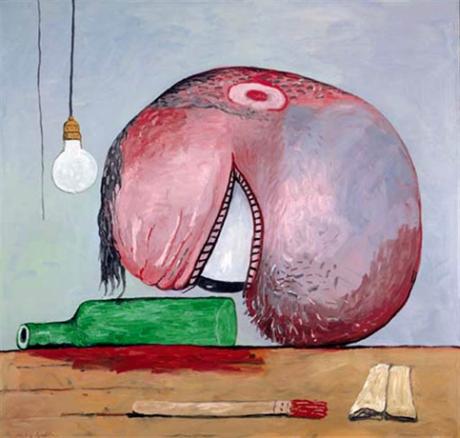
Head and Bottle
Philip Guston
1975
_______________________
Holy Cow: Parable Poems
Robert Peters
the philosopher
Robert Peters
he's an old man, an
old philosopher. he dies.
we embalm him and
wrap him in flannel.
we put him outside
on a wooden platform
near a limpid river channel.
he's dead for hours,
among the hydrangeas, castor
beans, and other commemorating
flowers. we read his works.
they're full of quirks: too
Kantian, too Platonic, too
erotic we laugh, go crazy,
get it on. an orgy. the wind
plays with his dead hair.
we show his dead eyes a
picture of Schopenhauer.
he stirs and yawns.
slowly, he undoes his bonds.
he leaves his ankies tied.
he looks a little dried
from the formaldehyde.
he resembles Freud. like
Socrates he sits
among his acolytes. one leg
dangles over the bed.
"Talk, talk, talk," he says,
"and fuck. That's all you do,
that's all you care about."
"Right on!" we shout, wondering
what the miracle is all about.
he throws off his clothes.
he fingers his groin. his cock
rises like Lazarus from the grave.
he doesn't miss a stroke.
we chant in rhythm with his
beat. he dies and lies back
down. angels the size of
fireflies materialize
from his sperm. each angel's
face is a famous philosopher.
the angels flutter in a ring.
they clap their hands and sing.
they drop their angel clothes
and enter the old man's body.
he flies to the sky.
_______________________

Robert Peters
(1924 – 2014)
My Father As House Builder
Robert Peters
Cedar poles skidded by horse
from swamp to highland, stripped
of bark, hauled to the house-site
on a knoll near the county road.
A pattern in the sand
for two rooms and kitchen, drawn
with a sapling and a string.
Cedar poles adzed flat,
other Poles notched for walls.
We chinked logs with swamp moss
secured by slats, then plastered.
We puttied the windows.
Scrap lumber for the roof and floors.
A cellar hole in the living room,
the sand fetched up by buckets
and dumped in a marsh hole
filled in for a garden plot.
The upper story, hip-roofed, low,
built without plumb lines.
Tin smoke-pipe leaning north,
tied by guy wires to the roof.
We nagged Dad to finish the walls,
but he never did.
The studs, he said,
were good for hanging pots and clothes.
The walls we insulated
with flattened cardboard boxes
and decorated them with pictures
cut from Hearst's American Weekly Sunday News.
_______________________
 Curtain
Philip Guston
_______________________
One might say that immensity is a philosophical category of daydream. Daydream undoubtedly feeds on all kinds of sights, but through a sort of natural inclination, it contemplates grandeur. And this contemplation produces an attitude that is so special, an inner state that is so unlike any other, that the daydream transports the dreamer outside the immediate world to a world that bears the mark of infinity.
Far from the immensities of sea and land, merely through memory, we can recapture, by means of meditation, the resonances of this contemplation of grandeur. But is this really memory? Isn’t imagination alone able to enlarge indefinitely the images of immensity? In point of fact, daydreaming, from the very first second, is an entirely constituted state. We do not see it start, and yet it always starts the same way, that is, it flees the object nearby and right away it is far off, elsewhere, in the space of elsewhere.
When this elsewhere is in natural surroundings, that is, when it is not lodged in the houses of the past, it is immense. And one might say that daydream is original contemplation.
Gaston Bachelard
b. June 27, 1884
The Poetics of Space

He Chongyue
_______________________
Nostalgia
Ricky D’Ambrose
quarterly conversation
1
Few habits are as prone to affliction, or as vulnerable to an ordeal, as the bent of a peddler’s consciousness. Placeless, the peddler completes an untold number of transactions; there are ideas to conduct (through language, which can transact a mind) and feelings to certify (through tasks, repeated interminably).
One example: Kleist, writing at the start of the nineteenth century, wanted the mind to catch up to language, which leads the way. Ideas, in Kleist’s view, can be made to syncopate with speech—and the mind can arrive at the summit or at the top of an idea—but through language alone, which forms and dispatches a thought spontaneously. For Kleist, what matters is the movement of a consciousness; an idea can never be fixed, but created only by the whim, and the digressiveness, of thinking aloud.
Another, much earlier example: the mystic, who expends a human life to verify his piousness, and whose own movement entails an ongoing series of tasks, a life project, that ensures the intimacy of his relationship with God. Events, like ideas, are replayed endlessly in the soul of the believer (the soul being, for the mystic, the exemplary scene of revelation).
Exhaustion, in either case, is never too far off. Approaching an idea under the demands of a peddler’s consciousness means enduring the fear of having arrived too late. In this scenario, the closed shop of the mind (or of the soul) admits a limited type and number of transactions, turning revelation—and both Kleist and the mystic are concerned, principally, with revelation, whether of a thought or of a God—into an impassable situation. But if one can no longer talk and think and move aimlessly, at the whim of chance, and if it is no longer possible to direct the ecstasy of a life outward, toward God, then another, less edifying option may be in store. In this third scenario, one rescinds a position without retracing one’s steps, moving backward with the impression that the consciousness of the peddler can survive the disapperance of the two techniques that prolong its legacy: perpetual motion and unlimited exchange.
When a consciousness, attuned to unlimited exchange and movement, is made anxious by a revelation that never occurs—the thought that language doesn’t disclose, the last judgment that never begins—then it may have no place else to go but backward. But there is only so much that the past can offer a nostalgic consciousness, which has nothing to offer but the guarantee of its spectatorship, of looking and watching—the docile view. The Angel of History looks back, impotently. The nostalgic looks back, more tolerant of this new impotence, but nonetheless saddened by what it implies.
“I do not want anything to do with a felicity that can spoil clairvoyance,” Gide writes. “It is essential to be able to find happiness beyond. Accertation; confidence; serenity: virtues of an old man. The age of struggling with the angel is over.”
...(more)
_______________________

He Chongyue
_______________________
Data Storms and the Tyranny of Manufactured Forgetting
Henry A. Giroux
The current mainstream debate regarding the crisis in Iraq and Syria offers a near perfect example of both the death of historical memory and the collapse of critical thinking in the United States. It also signifies the emergence of a profoundly anti-democratic culture of manufactured ignorance and social indifference.
(....)
Surely, the celebration and widespread prevalence of ignorance in American culture does more than merely testify "to human backwardness or stupidity"; it also "indicates human weakness and the fear that it is unbearably difficult to live beset by continuous doubts."[7] Yet, what is often missed in analysis of political and civic illiteracy as the new normal is the degree to which these new forms of illiteracy not only result in an unconscious flight from politics, but also produce a moral coma that supports modern systems of terror and authoritarianism. Civic illiteracy is about more than the glorification and manufacture of ignorance on an individual scale: it is producing a nationwide crisis of agency, memory and thinking itself.
...(more)
_______________________

Chen Jiagang
_______________________
In the beginning, there was madness. In the beginning, there was chaos. And all forms of sanity were formed out of madness. And the forms of order were shaped out of chaos.
He speaks of the last God. He speaks of God become madness, sheer, blazing madness.
He speaks of the last God, who has burnt away everything except sheer, blazing chaos.
(....)
Madness is a god that has forgotten it’s a god. No – madness is divinity without god.
Madness is the place from which gods are born. And into which gods collapse.
— Nietzsche and the Burbs
_______________________
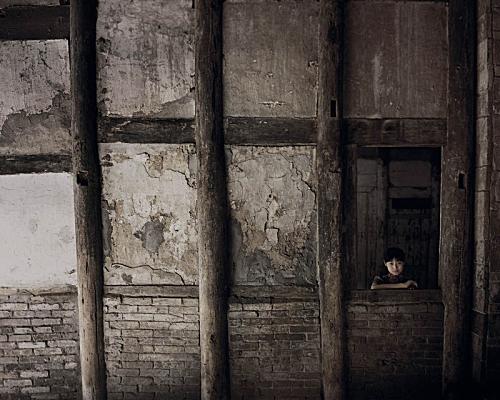
Old Wall
Chen Jiagang · Photography
1 2 3
_______________________
John Ashbery
Interviewed by Adam Fitzgerald
bomb
Through his translations from the French, John Ashbery joins a body of great twentieth-century American poets who have sought to trace their lineage from elsewhere, as much to undermine prevailing literary conventions as to inform us about those other traditions. In the twin prose and poetry volumes of Ashbery’s Collected French Translations, recently published by Farrar, Straus and Giroux, a compelling argument can be made—that the wild diversity and vitality of innovative American poetry operates today, in large part, because of what the translator-poet found in Raymond Roussel, Arthur Rimbaud, Giorgio de Chirico, and Max Jacob. By influencing Ashbery so decisively throughout a seven-decade career, these Frenchmen have shaped us all.
Adam Fitzgerald
(....)
AF Kenneth Koch turned you on to Roussel, coming back from his Fulbright in France. What was it about Roussel that excited you and still excites you now? For me, it’s hard to get into because it is just so dry.
JA That’s what I find so exciting. It’s as though he’s trying to reduce the temperature of literature to absolute zero. Somehow, the closer he gets to that, the more passionate it seems to become, just because of his fanatic and fantastic desire to reduce everything to something clear and passionless and meaningful only in itself. It doesn’t have any allegorical quotient.
AF In French, is it very literary? Once you said it was very technical sounding.
JA I think it was Leiris who said that Roussel wrote the kind of French that students were instructed to write at the Lycée: grammatically correct and totally limpid and cold. I don’t know why it appealed to me so much. I don’t think I’m a cold person myself. Maybe that’s why.
...(more)
BOMB 128 / Summer 2014
_______________________
 The Toy Shop
1962
Peter Blake
b. June 25, 1932
_______________________
Meta: Research in Hermeneutics, Phenomenology, and Practical Philosophy
Special Issue 2014: New Realism and Phenomenology

The Promenade
1947
Mario Carreño
1913 - 1999
_______________________
“Escape into Sanity: The Fall” by V.Q.
And then I fell! Stampeding the abyss, half-jumped, half-pushed, sick with speed and lonely as the unfolding landscape. There are moments when I cling. An old friend juts out like the branch of a tree. I catch her, it breaks. Another one breaks my fall, green and mossy, and oh, it is so lovely to see her, to see her smile again, her wonderful hair, the line of her lovely face, but I am gone again, now flailing, now poised, now sobbing back the breath that catches in my throat, now at war, now at peace. I fall on the back of a soaring eagle, but my old lover wants to take me back to the top of the cliff, to make me walk back with him to the place that I and we have been, but I don’t want to go back – it is impossible – so I let go his hand, jump off and continue my fall. Such velocity! And in the quiet moments, when I am simply… airborne… digging into the jam jars of memory with fingers longing for the past which is past, pulling the Tower again, again, dreaming of it, bending with the terrible noise of destruction in a city which I try to leave the same way I came in, but the entrance is boarded up and a waiter chides me, you cannot leave the way you came in, you must leave by a different route. And so I turn towards the chaos of my life. The chaos of the city, of Society, of loneliness. And I am an angry tide, a gentle tide, ebbing and flowing through the necessity of change, responsibility and the search for the self. This was my doing, that was not. In any case, my response was always my own. And beyond the tears, and the smashing of chains, the loss of a world, the loss of a friend, of dogmas that kept me somehow safe, something settles in me. Dust after the volcano.
Slowly clearing. Slowly. A peculiar and hitherto never experienced… equilibrium.
...(more)
Inter Arma
_______________________

Woman with a Fan
ca. 1912–13
Jean Metzinger
b. June 24, 1883
_______________________
Spironolactone
Tamara K. Walker
identity theory
(....)
this one’s about purging. most medicinal, each coated dose of the past present and forever clears the Master Boot Record of dim plural protoplasms. what operating system are you running? hardware software hardware wetware. i wonder if chelsea1 was aware of the double entendre of ‘motherboard’. these petulant passétech metaphors are comforting. optimize. yes, just optimizing: efficiency, efficacy. the same way makeup optimizes your face and murmured subliminal suppositions optimize the way you respond nakedly to oblique sensation under weeping willows swaying under cinder blocks tethered to their branches with cable ties. you want to ease their concrete encumbrance, because then the branches won’t brush your increasingly sensitive skin and remind you of how poorly documented and advertised your software is, but you haven’t always had the strength to emit sledgehammers.
...(more)
_______________________
Zündel’s Exit – Markus Werner
reviewed by Patrick Smith
Full Stop
... Zündel’s Exit fits into this sub-genre, the give-up novel. Opening the book for the first time, hoping it would turn out to be a true give-up novel, I have to admit that I had a bias: I seek out such books and they are easy for me to love; they look at the world in a way that puts glee and despair into the same dish, and it is an immensely satisfying one. So I started, biased to favor the book, ready to adjust expectation and interpretation if it turned out to be something else.
The first paragraph, opening Zündel’s worldview, let me laugh, cringe, and breath. Zündel watches as a terrified lost child searches for his mother, finds her, rushes to her for safety, and is rewarded suddenly with smacks and scolding. This is the world as Zündel sees it, cruel, disappointing, and lacking compassion. When the child vomits, he tries to help, and yet sees his efforts as a failure, too late, cruelty already witnessed. Soon after, Zündel stakes his claim as to what it means to be of the world: “See, I’m not unworldly after all that. I can lie. I am competent.”
Zündel does not want to be worldly, though, does not want to be competent, only to lie enough to skip by and give up. Why would one want to continue playing alongside or fighting against a world when it leads him to this: “That’s life, my life anyway, chains, falls, scrapes, and I’m afraid I pissed myself as well. I need to get out of these trousers.” This is our hero, Zündel, resigned to a life of practical and bodily failure, with a mocking sense of false dignity showing through in the polite phrasing, “I’m afraid.” In tone, it almost isn’t even a complaint, rather an observation.
...(more)
_______________________

Landscape with Drying Sails
1931-32
Stuart Davis
d. June 24, 1964
_______________________
The sun does not rise
How magical thinking haunts our everyday language, and fossilised ideas live on in even the most sophisticated science
Andrew Crumey
aeon
(....)I would like to propose what I shall call the principle of eternal folly. It states that in nearly every era there arises, in some form, nearly every idea of which humans are capable. Certainly, there is the emergence of new ideas: technological ones are the most obvious, but there are others, too. I do think it fair to say that Jane Austen, Beethoven, and even the occasional entrepreneur have invented radically new things. However, the vast majority of ideas are recycled – and it is when we fail to recognise this, as we eternally do, that we commit folly.
(....)
The recurrence of ideas over the course of history is something that Jung or Pauli would have attributed to archetypes in the collective unconscious. An alternative would be the finiteness of human imagination, and susceptibility to cultural influence. While scientific theories can become increasingly technical and abstract, the brains that struggle to interpret their meaning haven’t evolved much in the past 50,000 years. If our own brain is a kind of living fossil, it’s hardly surprising that so much of what we do with it is metaphorically fossilised too.
...(more)
_______________________
From Bards to Search Engines:
Finding What Readers Want from Ancient Times to the World Wide Web
Stephen M. Maurer
Abstract:
Copyright theorists often ask how incentives can be designed to create better books, movies, and art. But this is not the whole story. As the Roman satirist Martial pointed out two thousand years ago, markets routinely ignore good and even excellent works. The insight reminds us that incentives to find content are just as necessary as incentives to make it. Recent social science research explains why markets fail and how timely interventions can save deserving titles from oblivion. This article reviews society’s long struggle to fix the vagaries of search since the invention of literature. We build on this history to suggest policies for the emerging world of online media.
Social Science Research Network (SSRN)
_______________________

Red Brick Buildings
Stuart Davis
_______________________
Capitalism Exploits The Body’s Response To Traumatic Stress
Laura K Kerr, Ph.D
(....)
For the most financially precarious (an ever-widening sector of the population), capitalism creates a state similar to the psychological domination that can occur when people are held in captivity. Psychological domination is more likely when 1) the threat is unpredictable and 2) there are periods of relative safety amid the chaos and abuse. Psychologist Judith Herman observed, “The ultimate effect of [psychological domination] is to convince the victim that the perpetrator is omnipotent, that resistance is futile, and that her life depends upon winning his indulgence through absolute compliance.” Certainly the psychological impact of capitalism fails to reach the severity of a person whose basic right to freedom from harm is taken away. Rather, my argument is that capitalism is more precarious than reliable, creating conditions that are often inhumane and that lead to traumatic stress.
(....)
Capitalism is not the only social system that exploits the body’s natural responses to power and dominance. All societies must contend with the human capacity for dealing with power dynamics and the stress they can cause on the body. Status is integrally associated with power and is present in all forms of society, even those such as the Intuit, Navajo Indians, and !Kung San, which are noted for their egalitarian social structures. What differs is how members deal with the quest for status and power. In smaller, egalitarian societies the quest for status and power is often systematically undermined, whether through derogatory remarks to the one who boasts about his successful hunt, or the isolation of those who attempt to bully others into submission. Capitalism differs from such egalitarian societies when it exploits conditions that activate traumatic stress rather than minimizing them. Whereas egalitarian societies respond to power and status by trying to mitigate its effects, capitalism propagates traumatic stress in ways that promote the pursuit of power and status, which ultimately keeps the system functioning.
...(more)
via I Cite _______________________
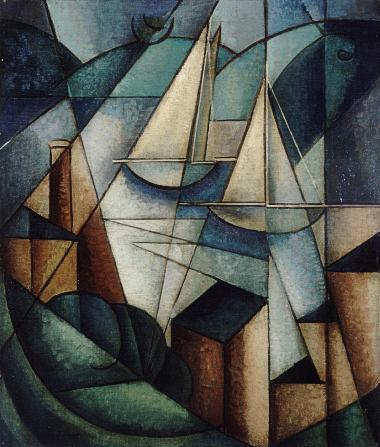
Jean Metzinger
ca. 1912
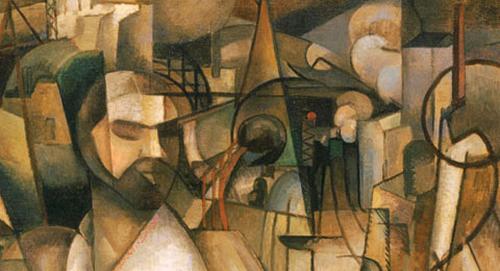
l'Homme au Balcon
1912
Albert Gleizes
d. June 23, 1953
_______________________
from Mozart's Third Brain
Göran Sonnevi
(translated by Rika Lesser)
(....)
CVIII
I hear my father saying: Are you stark-raving mad? The rapidly outdated
language moves like snowflakes through my memory
The dead do not rest
They walk through the world, we don't need to call to them
They are
their own interpretation
They, too, exist in what's foreign
We are parts of language
We cannot take anything back
Can we stop short of the abyss?
We fall deeper and deeper, glass-clear, as if in justice to clarity
But nothing is clear
Intuitions come hovering, scarcely distinguishable
forms in nothing, like ice-profiles in water, the dragonfly's vanishing
pairs of wings
The small mountain ashes' new leaf bouquets emerge, into nothing
Becoming in annihilation
A slightly varied formulation
of Hölderlin's thought
Disappearing far out on one of
the tangents of glass
While the hypersphere grows and grows
I hear impersonal music, no human's music
Again I'm very scared
What do I dare? What don't I?
What kinds of becoming
The existing annihilations rampage all around us
In which do we take part
Breaking out into total answerability
...(more)
via Flowerville
_______________________
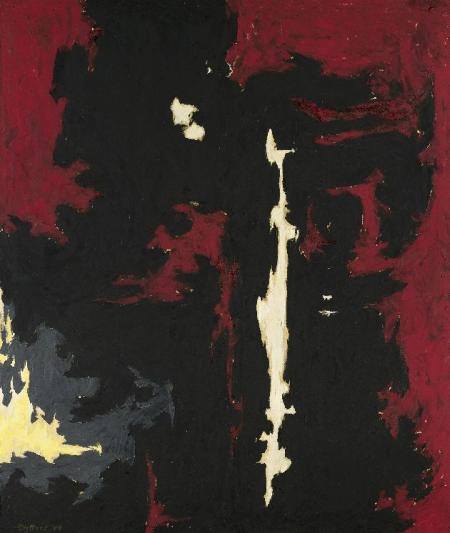
1949-A-No.1
Clyfford Still
d. June 23, 1980
_______________________
A Way of Seeing
Abayomi Animashaun
If at night you enter a forest with a lantern—
Flame, risen and warm against the glass—
And the mast of that ship within you is blown,
Caught, and alive with wind,
Pull your oars in from Reason’s sea.
If later within that lantern,
The flame thins and dies,
Owls from the deck’s dark corners will emerge,
Singing like your dead grandfather,
Playing flutes like his wives,
Drunk and dancing upon the stern.
Passages North Issue 35
Four PoemsAbayomi Animashaun
diode
A Plural Imagination: On Being A Nigerian Poet
Abayomi Animashaun
adirondack review
“…literary periodization [is] a messy business… [Once] time-lines are drawn
and writers are placed within them, the intuitive clarity of the lines blur, as
writers who should be within the period by nature of their preoccupations and
styles fall outside and others within very clearly pronounce their unbelonging.”
—
—Harry Garuba
I am of the mind that the poetic imagination tends toward plural manifestations instead of singular constructions. Thus, it is possible for a Nigerian poet to write in iambic hexameter, speak of corrupt leaders, write in abstractions, use difficult language, be elliptical, use clear language, be purposefully apolitical, and still be the same poet. If some major figures of each poetic movement in Nigeria had kept this in mind, perhaps their rejection of their predecessors’ poetic tendencies would not have been so categorical. One finds it a wonder how poets become so absolute in their rejection of other poets’ methodologies, especially when the doors to poetry are infinite. That said, I will begin by providing a short discourse on Nigerian poetry, discuss how current delineations of Nigerian poetry collapse upon themselves by showing how key properties that mark a generation are utilized by others as well, and make a case for inclusion as the primary matrix out of which my own poetics evolve.
...(more)
_______________________

No Charge for Delivery
1947
Kurt Schwitters
b. June 20, 1887
_______________________
Draft 85: Hard Copy
Rachel Blau DuPlessis
1.
17 May 1986.
Or whenever "now" is.
Enough to look at here
For the rest of a lifetime.
Even the simplest things,
Their provenance—
a shoe, a prosthetic
post-war leg
reminding you of
silent doubles
unfinished, imperfect,
imperfect, shadowy.
Slowly the particulars
get scattered to the wind
and one is left
with what is under the surface
trying to come to light
what has not yet
been found nor
been found
out.
(....)
6.
Civitas uncanny,
darkened, stippled, riven
with confusion and contradiction.
The dark being both obscurity and incipience,
it's light that becomes
perfectly unnerving.
The problem is to articulate
any promise of the civic,
without this glint of the apocalyptic.
7.
Bewildering what happened.
The profligate rip of earth, of persons,
of the sharers—plants & mites & languages—
down to the very bit of fleck along the crack.
Is it "your dead" or "you're dead"?
One in the news, or not,
one in some myth, or not—
who no longer finds
credible the humane part
of human nature.
Yet knows in the gut
that something large was thereby lost:
and wants to find it, choose it again,
affirm it as possible.
Open the door
says a weeper
to a stone room,
do not take the path
of the indifferent.
...(more)
Fierce storehouses of articulation (PoemTalk #69)
Rachel Blau DuPlessis, sections 16 & 29 of 'Draft 85: Hard Copy'
_______________________

Aphorism
Kurt Schwitters
1923
_______________________
The Onion [pdf]
(Merzpoem 8)
Kurt Schwitters
Translated by Peter Wortsman
It was a very momentous day, the day on which I was to be slaughtered. (Fear not, have faith!) The king was ready, the two attendants were on hand. The butcher had been ordered for half past six; it was a quarter past and I myself arranged for the necessary preparations. We had selected a spacious hall for the occasion, so that many spectators could comfortably take part in the festivities. A telephone was within reach. The doctor lived next door and agreed to be on call if a member of the audience fainted. (A memento of your confirmation.) Two mighty pulleys hung from the ceiling to crank me up afterwards, in case I was to be disemboweled. Four strong lackeys stood ready to lend a hand, former Russian prisoners of war, stout, big-boned boys. (Better Homes and Gardens Magazine.) Two immaculate chambermaids were also on hand, clean-as-a-whistle wenches. It was a pleasant thought that two such pretty girls would whorl my blood and wash and prepare my inner organs.
The hall had been swept and scrubbed clean for the occasion. I had them place two long white smooth-topped tables against one wall; on the surface they’d stacked some dishes, knives and forks. I just had them bring over a water basin, water and a washcloth, some soap too (only Ivory). Anna and Emma, the two scullery maids, brought a bucket and whisk. It is, after all, a curious feeling to know that you are to be slaughtered in ten minutes time. (The sacrifices of motherhood.) I had never yet in all my life been slaughtered. You’ve got to be ripe to be ready. It’s high time when the potatoes have been dug up and the oats harvested, that’s the time to act. We haven’t really even had much of a summer yet. Ten minutes can seem very long. (Faith, Love, Hope.) (Ducks go goosing along on the lawn.) Everything down to the smallest detail has been made ready.
...(more)
via the page
_______________________

Jamais
Clyfford Still
May 1944
_______________________
Positing Futurity: The Possibilities of Utopology
Craig Hickman
alien ecologies
(....)
This unprecedented spatial and moral secession of the wealthy from the rest of humanity also expresses itself in current fads for high-end monasticism (Sara Lipton), floating city-states (China Miéville), space tourism, private islands, restored monarchies, and techo-murder at a distance (Dan Monk). The super-rich can also retreat, self-deified but not yet dead, into their marble mausoleums (see Joe Day on personal museums), or buy up to 2 million acres of ranchland and singlehandedly “save Nature” (see Jon Wiener on Ted Turner’s bison). Where the rich lack requisite power and numbers to create new luxury cities (as at Arg-e Jadid in Iran) or gentrify wholesale old capitals (like London or Paris), they can nonetheless “disembed” themselves from the matrix of popular urban life through the creation of separate transportation and security systems (as in Managua, discussed by Dennis Rodgers) or by the radical disfranchisement of poor people’s right to unconditional use of public streets (as in the U.S. Supreme Court ruling in the case of Hicks, described by Don Mitchell). In post-Taliban Kabul (described by Anthony Fontenot and Ajmal Maiwandi), they simply evict the poor to build their palaces: an exhibitionist narco-warlord architecture that quotes both Walt Disney and Genghis Khan.
The superrich live in capitalotopic conclaves of corporatism that leave the rest of us wandering the hells of the forgotten and excluded; or, even disposable and untouchables outside the gates to these safe havens of sin and death-pleasures. The neo-liberal pursuit of riches is nothing less than a utopian frenzy, and the early twenty-first century, with its global vogue for evil paradises (of which Dubai may be both the most remarkable and sinister) recapitulates many of the same mythic, impossible longings that Walter Benjamin discovered in his famous excavation of Baudelaire’s Paris. With Marx’s theory of commodity fetishism as his Rosetta stone, Benjamin unraveled the mystery of the bewitched capitalist city where human collectivity, overwhelmed by its own colossal productive powers, hallucinates its social being as a swirling “dream-life of objects.” But the inverted realities and false consciousness of the Victorian era have now grown to Himalayan, life-threatening proportions. If the iron-and-glass arcades of the 1850s were the enchanted forests of early consumer capitalism, today’s luxury-themed environments—including city-sized supermalls, artificial island suburbs, and faux downtown “lifestyle centers”—function as alternative universes for privileged forms of human life. On a planet where more than 2 billion people subsist on two dollars or less a day, these dreamworlds enflame desires—for infinite consumption, total social exclusion and physical security, and architectural monumentality—that are clearly incompatible with the ecological and moral survival of humanity. (Davis, Dreamworlds)
The need for an alternative counter to the neo-liberal fantasias and evil paradises is the ultimate political act ...(more)
_______________________

Clyfford Still
1960

No. 14
Mark Rothko
1960
_______________________
Slow Song for Mark Rothko
and
Inside Out
by John Taggart
Slow Song for Mark Rothko
1
To breathe and stretch one's arms again
to breathe through the mouth to breathe to
breathe through the mouth to utter in
the most quiet way not to whisper not to whisper
to breathe through the mouth in the most quiet way to
breathe to sing to breathe to sing to breathe
to sing the most quiet way.
To sing to light the most quiet light in darkness
radiantia radiantia
singing light in darkness.
To sing as the host sings in his house.
To breathe through the mouth to breathe through the
mouth to breathe to sing to
sing in the most quiet way to
sing the seeds in the earth breathe forth
not to whisper the seeds not to whisper in the earth
to sing the seeds in the earth the most quiet way to
sing the seeds in the earth breathe forth.
To sing to light the most quiet light in darkness
radiant light of seeds in the earth
singing light in the darkness.
To sing as the host sings in his house.
...(more)
_______________________
"Reasons for Singing"
Jacket2 feature, edited by Matthew Cooperman, which pays tribute to the long life and poetic career of John Taggart. Comprised of critical essays, recollections, poetry, and correspondence, the feature includes contributions from a wide array of authors, including Peter O'Leary, Pam Rehm, Mark Scroggins, Joseph Donahue, Stephen Ratcliffe, Patrick Pritchett, Marjorie Welish, and Robert Bertholf, among others, along with two pieces by Taggart himself.
'Reasons for singing': On John Taggart
Matthew Cooperman
(....)
As I’ve come to understand there is something continuous in the work of John Taggart. Thinking on and through, thinking with, “a case = relation.” Lines as artifactual actions notating culture, history and faith as a recirculatory figure centered on/experienced by, a first person, but the person changes; how, as Creeley says, “the local is not a place but a place in a given man — what part of it he has been compelled or else brought by love to give witness to in his own mind. And that is THE form, that is, the whole thing, as whole as it gets.” John Taggart’s whole thing seems uncannily of a piece, compelled by a various love to bear witness in decidedly formal and urgent poems. Distinctive, looping repetitions, phrasal accretions, often hinged on infinitive verb constructions, hovering, open field pages, incantatory crescendos and releases more akin to musical composition than poetry — all oddly about something, you hear a Taggart poem when you see one. “The vision seeks the man.” Behind this is the physical earth on which Taggart has plotted his course. It is as much a plat as an open book; increasingly, it is his home place in rural Pennsylvania, which is to say there is “a there there” to the ground on which Taggart tests his sincerity and, as such, makes his practice a unique example of field poetics. Something specific of late twentieth-century historicity, something actual in the climes in which it is experienced. The page aligns with the place, bears increasing traces. Not surprisingly, there is also a great variety of subjects, places in the given man.
More specifically, John Taggart’s sincerity-in-sound-structure manifests as four largely continuous attentions: a significant body of work written on/from/about art, music, and literature — Bradford Graves, Edward Meatyard, Edward Hopper, Edward Weston, Mark Rothko; Marvin Gaye, John Coltrane, Steve Reich, Sainte-Colombe, Olivier Messiaen; Marianne Moore, Louis Zukofsky, Thomas Bertram, Lorine Niedecker, Henry David Thoreau, etc.; some of the most distinguished long poems of the postwar period — “The Rothko Chapel Poem,” “Peace on Earth,” Pyramid, Dodeka, When the Saints, “Unveiling/Marianne Moore,” etc.; a poetry deeply attuned to matters of the divine ecumenically construed; and a particularly distinctive musical style that proliferates and permutates through serial composition. These four aspects have been a constant since his first book in 1969. Yet it has also been observed (Peter O’Leary) that his poems have evolved across three distinct formal shifts. We might group the books thusly: the highly structural and mathematical To Construct a Clock, The Pyramid is Pure Crystal, and Dodeka; the looser and more compulsively repetitious wave forms of Peace on Earth, Loop, Standing Wave; and the more improvisational/discrete-but-also-personally-intimate collections of the 2000s, When the Saints, Pastorelles, and There Are Birds. There are other books before and within these evolutions, but the structural fingerprints of these stylistic formations inheres. Yet across these evolutions there is a constant attention to the incremental song, or what Taggart himself has called “songs of degrees,” the title of his excellent book of essays, and a pun on two of Taggart’s poetic wellsprings: Zukofsky, specifically his volume Some Time (1956); and the Psalms (Songs of Degrees, 120–134). In this manner thinking and singing are inextricably bound up for John Taggart with reading and listening, a reading and listening that for the last forty years has charted a distinct course in postwar American poetry.
...(more)
_______________________
 No. 12
Mark Rothko
1960
_______________________
In Layers
John Taggart
(....)
There was woods and there was only woods in the beginning only canopy
and understory stories with the Indians in and out of the stories which became
different stories with the settlers who cut down the woods to make houses
and fields and to keep houses warm in long unrelentingly cold winter.
Leaving only tallest sycamores with massive camouflage colored trunks and
cream colored narrow tops not good for burning or for building who cut
down the woods to make houses and fields who cut down and through
the understory story to make a mill-race a wooden mill with a wooden wheel.
The mill abandoned the mill-race silted over and clogged where it joins
a creek or small river with many turnings the fields going to weeds
dewberry trumpet vine poisonous pokeweed goldenrod the woods returning
to woods cherry witchhazel hawthorn hackberry redbud hard and soft maples.
The creek or small river remaining with its many turnings remaining not
moving but flowing weeds cut down the fields plowed and disced and
disced again and dragged the woods re-cut and mowed to make a path with
its own turnings under the canopy remaining and through the understory.
...(more)
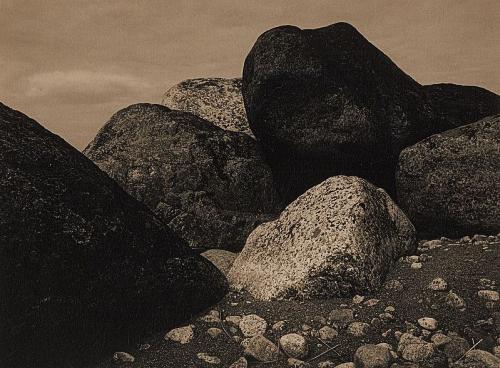
Pitkaviira, Finland
1973
Pentti Sammallahti
1 2 3 4 5
_______________________
Derrida and Žižek: [pdf]
On the intersections of Différance and Parallax, From Eating Well to the Necessity of Idiocy
Virgilio A. Rivas
Abstract:
One of the most interesting ways of addressing the question of the subject in the wake of postmodernism is to approach it from the encounter of Žižek’s thought with that of Derrida. In the aftermath of Žižek’s criticism of Derrida’s deconstruction, one is faced with the dilemma about the feasibility of the Derridean ethical paradigm in the coming of the “impossible,” the “other,” or the god who-is-“to-come.” If the human subject can only survive by “eating” other human beings in cannibalism, is there still hope in any human ethical enterprise? Using the trope of cannibalism, this paper attempts to assess the whole deconstructive project as an establishment of a fundamental structure of human survival. All human beings must overcome the evils of egoism—as the fundamental problem of the subject—if humanity is to survive. Curiously though, for Žižek, this survival hinges on the figure of the idiot. Filocracia 1:1 An Online Journal of Philosophy and Interdisciplinary Studies
_______________________
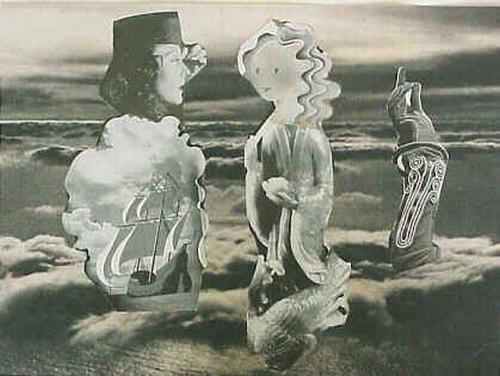 photomontage
"Une Rencontre de Rêve avec Vénusminati"
Paul Joostens
b. June 18, 1889
The Dialects Of Avant-Gardist Paul Joostens _______________________
On Dismantling The Master’s House [pdf]
François Laruelle's Theory in Practice
Roshaya Rodness
The anti-racist and feminist Audre Lorde’s now famous edict, “the master’s tools will never dismantle the master’s house” has always struck me as a provocative summons rather than a description of current or even future scholarship. For it would seem that the most direct, intuitive route to dismantling would be to locate the master’s tools and use them as he did, in reverse. But the project of challenging the structural foundations of racism is neither direct nor intuitive, and I read Lorde’s too oft straightforwardly-read statement as a challenge to widen our gaze to the structural substrates of our existences and to rigorously embrace radical methodologies that actively provoke and challenge traditions of thought, an endless dismantling that is never to be dismantled. Lorde’s powerful summons is also a call to reconfigure the use of critical theory, or to use the tools of theory without mastery as their objective. François Laruelle’s intentions in creating a non-philosophy seem to harmonize with Lorde’s vision. Laruelle has created a theory that examines philosophy from without, seeking to expand its horizons beyond its standard use. The terms that comprise non-philosophy are philosophical, but used “non-philosophically,” or neutered of their philosophical utility. Reading Laruelle, it can appear as if his prose is simply a repetition of that which he critiques, when in fact he has refashioned these tools into a strange, radical vocabulary that renders inoperable the philosophical means of knowing the Real. Non-philosophy is designed to “destroy the classical usage of philosophy,” but what kind of theory is this, considering that destruction as a mode of theory strikes a chord whose vibration reverberates deep into the recesses of continental philosophy? Lorde’s and Laruelle’s words join Heidegger’s Destruktion and Derrida’s deconstruction in the history of critical theory, even as Lorde and Laruelle want to limit the claims of that history. If destruction is also one of the master’s tools, then Laruelle’s idea of what it means to destroy the classical usage of philosophy is neither direct nor intuitive, and the kind of practice that non-philosophy imagines itself to be doing requires a robust, fine- grained inquiry. What follows will be a consideration of non-philosophy as a practice and a pedagogy as well as a methodology that radically reimagines what it means to use critical terms in communities of thought.
Chiasma: A Site for Thought
Issue 1.1: What the Doing of Thinking Does and Doesn’t Do Today _______________________

L’arrivée de Sainte-Ursule
Paul Joostens
1930 _______________________
Spasm
F.Bifo Berardi
(....)
Chaos is when the infosphere goes too fast and the mind is unable to elaborate and comprehend the signs that are coming from it. In the last chapter of their last book Deleuze and Guattari speak about the relation between chaos and the brain. The conclusion of the book entitled “From Chaos to the Brain” starts with the following words:
require just a little order to protect us from chaos. Nothing is more distressing than a thought that escapes itself, than ideas that fly off, that disappear hardly formed, already eroded by forgetfulness or precipitated into others that we no longer master. These are infinite variabilities the appearing and disappearing of which coincide. They are infinite speeds that blend into the immobility of the colorless and silent nothingness they traverse, without nature or thought. This is the instant of which we do not know whether it is too long or too short for time. We receive sudden jolts that beat like arteries. We constantly lose our ideas.” (Deleuze Guatttari, What is philosophy?, pag. 201)
Consciousness is too slow for processing the information that comes from the world of acceleration (info-technology multiplied by semio-capitalist exploitation); the world simply cannot be translated into cosmos, mental order, syntony and sympathy. Consequently we need a transformation, a jump to a new refrain, to a new rhythm. For Guattari, chaosmosis is the shift from a rhythm of conscious elaboration (refrain) to a new rhythm. In other words, it is a shift in the speed of the processing consciousness-the creation of a different order of mental processing. The osmotic effect that relaxes the spasm and heals the spasmic sensible organism is based on the shift from a rhythm where there was only chaos to a rhythm that makes sintony possible again.
...(more)
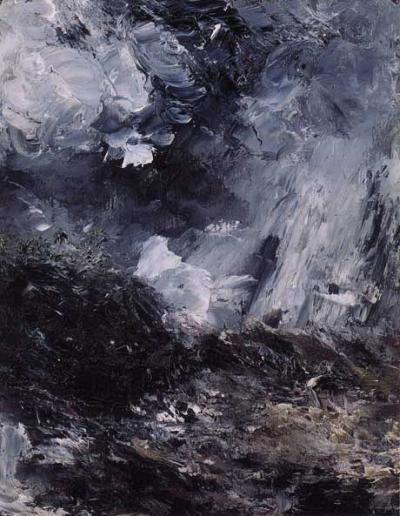
Night of jealousy
August Strindberg
1893
_______________________
We Waves
August Strindberg
Translated by Edwin Björkman
We, we waves,
That are rocking the winds
To rest--
Green cradles, we waves!
Wet are we, and salty;
Leap like flames of fire--
Wet flames are we:
Burning, extinguishing;
Cleansing, replenishing;
Bearing, engendering.
We, we waves,
That are rocking the winds
To rest!
_______________________
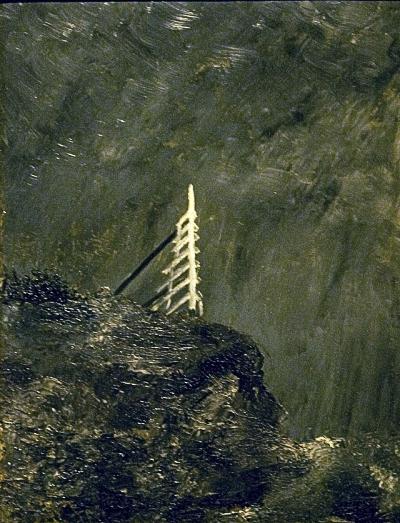
The White Mare II
August Strindberg
1892
_______________________
On Seeing the Wind at Hope Mansell
Geoffrey Hill
Whether or not shadows are of the substance
such is the expectation I can
wait to surprise my vision as a wind
enters the valley: sudden and silent
in its arrival, drawing to full cry
the whorled invisibilities, glassen towers
freighted with sky-chaff; that, as barnstorming
powers, rammack the small
orchard; that well-steaded oaks
ride stolidly, that rake the light-leafed ash,
that glowing yew trees, cumbrous, heave aside.
Amidst and abroad tumultuous lumina,
regents, reagents, cloud-fêted, sun-ordained,
fly tally over hedgerows, across fields.
_______________________
Geoffrey Hill and the poetry of ideas
Daniel Johnson
standpoint
(....)
This entire May lecture was dedicated to resolving a single question in a single poem, "The Windhover" by Gerard Manley Hopkins: to whom was his vivid evocation of the "lyric flight" of the bird addressed? Was "thee" the bird or the poem's dedicatee, Jesus Christ? (Long after writing it, the poet added the title "To Christ our Lord", but there is no obvious solution.) In the hour spent answering this question, Hill offered a defence not only of poet and poem, but also of the "earnestness of spirit" — saturated in Classical culture and Catholic theology — that had made it possible for Hopkins to "find his way right at last to the true functions of his mind" and in doing so to create the new prosody of sprung rhythm. The very artificiality of such an "abrupt metre" creates naturalness, Hill argued, with a characteristic sideswipe at contemporary poets: "If only that were better understood at the present time."
(....)
Poetry as transfiguration of language: Hill has pursued this project with iron consistency for more than 60 years, ever since his first slim volume (a pamphlet of five poems, now extremely rare) appeared in 1950 while he was still a 20-year-old undergraduate at Keble College, Oxford. But for Hill the poetical has always been the political. In his Oxford lecture he thinks foul scorn that politicians should presume to be above criticism in their use and abuse of language. Indeed, the prophetic mode comes naturally to him in verse and prose.
(....)
Asked if he liked a particularly severe photograph of himself, he replied: "It terrifies me." While he believes strongly in the poet's need to understand and justify his own methods, he accepts that poetics must never tyrannise over poetry. His doctrine that "the grammar of the poem decides the grammar of belief" must be suspended to grasp what is going on in "The Windhover": the "chevalier" to whom Hopkins speaks is Christ, but only Hill's theological intuition, not the internal evidence of the poem, tells him so. Hill cheerfully admits to his own eclecticism: "I am a walking example of the marvels of serendipity."
...(more)
Standpoint June 2014
_______________________
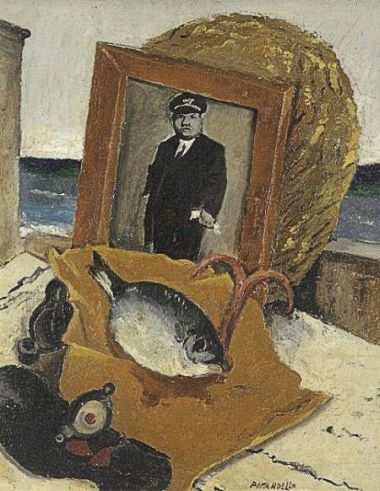
Fausto Pirandello
b. June 17, 1899
_______________________
Rainy Fascism Island
Nina Power
(....)
The feudal shire that is Britain, or rather England, has never gone away. The financial class governs as it always did, just with fancier technology, like Lords of the Rings meets Fruit Ninja, an app that the prime minister, David Cameron, according to one aide, spends a “crazy, scary” amount of time playing. All these people go to the same schools, the same universities, have the same slave-owning, land-pilfering ancestors. They all know each other and visit each other’s country homes, where they hang out with journalists and celebrities to reassure each other that the world belongs to them. The shire is home, where money and power begin and end. To abolish Britain would be to abolish the shire and everything that follows from it.
The fatalism of this feudal financialization—the idea that however inoperative, destructive, and untenable the continued reduction of all value to economic exchangeability might be, it is the only way—fuses all too easily with the regressive antimodern sentiments of ultranationalists everywhere, where money meets malice and patriotism meets the property market. In the era of post-political antipolitics, where the Futurists’ dream that libraries would perish is speeding up, it is resentment that congeals and sticks. Time and space didn’t die, as the Futurists imagined. They were merely sold off. Banks live on as if in some perpetual present, propped up eternally by the state, less zombie than Zimmer-frame capitalism. All else can perish, if it can no longer be asset-stripped or mined for the antipathy of a public made cruel by the myth that it is the one who suffers at the hands of those who have no weapons.
A video of a fox hunt played backwards would show the fox chasing the hounds arse-forwards, with posh people on horses running for their lives. I hope they do.
...(more)
The End of the End of Historye-flux journal issue 56
with James T. Hong, Nina Power,
LaborinArt (Önder Özengi, Pelin Tan) in
conversation with Franco “Bifo” Berardi,
Sabu Kohso, Oleksiy Radynski, Oxana
Timofeeva, Walid Raad, Boris Groys,
Lawrence Liang, Raqs Media Collective,
Szabolcs KissPál, Liu Ding and Carol
Yinghua Lu, and Daniel Birnbaum
Running Along the Disaster: A Conversation with Franco “Bifo” Berardi
_______________________

Celestograph I
(The Full Moon)
photo by August Strindberg
1893-9
“I have worked like a devil and have traced the movements of the moon and the real appearance of the firmament on a laid-out photographic plate, independent from our misleading eye. I have done this without a camera and without a lens. [...] The photographic plate showed an area full of moons. Certainly, every spot on the photographic plate reflects a moon. The camera misleads as the eye does and the tube hoaxes the astronomers!”
-- August Strindberg: from a letter to physiologist Bengt Lidforss, 26 December 1893
Strindberg's Celestographs: A Nonmechanical Cosmophotographypresented by Tom Clark

Celestograph XII:
photo by August Strindberg
1893-94 The Celestographs of August Strindberg
Douglas Feuk
Translation: Birgitta Danielsson
cabinet
_______________________
Manifestos and Metaphysics: Vattimo and Zabala’s Hermeneutic Communism
Eduardo Mendieta
(....)
Gianni Vattimo and Santiago Zabala’s Hermeneutic Communism: From Heidegger to Marx could be read as a “manifesto,” or at the very least a “proclamation.” The book is full of provocative readings that aim to provide grounds for the authors’ basic argument, namely that only “weak thought,” which claims to be the fulfillment of hermeneutics (the imperative to interpret), can prepare us for the advent of communism. This coming of communism, in turn, is presented as a historical event that sunders the continuum of history. Communism is the irruption of the “new” in history. Put succinctly, hermeneutic communism is thus communism purified of all metaphysics. Metaphysics is that part of philosophy that aims to provide ultimate foundations for our epistemic, ethical, and political claims, and thus metaphysics is to philosophy what foundations are to skyscrapers: without them, they don’t hold up. What this means, then, is that a weakened communism, or hermeneutic communism, abjures any reference to grounds, whether those are the laws of nature or the laws of history.
(....)
Hermeneutic communism, stripped of all metaphysical referents, aims to rescue that ethical dimension of communism. Vattimo and Zabala argue something like the following: we live in the age of the end of metaphysics. All that remains after the demise of metaphysics is the imperative to interpret (hermeneutics). Consequently, all we have left is history and our attempts to make sense of it — in other words, since the only available point of reference is the history of interpretations, hermeneutics, pure interpretation, is all we have left. And hermeneutics is the only philosophy that we need or could need, for in it we find both a politics and ethics. The politics left after the demise of metaphysics, the authors claim, is that of a weakened communism, that is, a communism without metaphysical support, one that offers itself simply as the clamoring of the oppressed and the appellation for economic justice of the victims of capitalism. The ethics implied by this is an ethics of interpretation, in which all interpretations have a prima facie claim to be heard and countenanced.
A number of questions follow. ...(more)

Miroir de LIngree
1945
Victor Brauner
b. June 15, 1903
_______________________
Whether we are sovereign or enslaved in our being, what of it? Our species will still look to the future and see no need to abdicate its puppet dance of replication in a puppet universe where the strings pull themselves. What a laugh that we would do anything else, or could do anything else. That our lives might be a paradox and a horror would not really be a secret too terrible to know for minds that know only what they want to know. The hell of human consciousness is only a philosopher's bedtime story we can hear each night and forget each morning when we awake to go to school or to work or wherever we may go day after day after day. What do we care about the horror of being insufferably aware we are alive and will die ... the horror of shadows without selves enshrouding the earth ... ort he horror of puppet-heads bobbing in the wind and disappearing into a dark sky like lost balloons?
[...] Almost nobody declares that an ancestral curse contaminates us in utero and pollutes our very existence. Doctors do not weep in the delivery room, or not often. They do not lower their heads and say, 'The stopwatch has started'. The infant may cry, if things went right. But time will dry its eyes; time will take care of it. Time will take care of everyone until there are none of to take care of.
from Thomas Ligotti, The Conspiracy Against the Human Race
posted at Spurious
_______________________

Doll
1949Kati Horna
1912 - 2000
1 2 3
_______________________
McMindfulness
The marketing of well-being
Jeremy Safran
Public Seminar
(....)
Never mind the fact that the research that has compared mindfulness-based cognitive therapy to traditional cognitive therapy (the latter allegedly being the evidence based treatment of choice) finds that the emperor has no clothes. And never mind the fact that there is no solid evidence that traditional cognitive therapy is more helpful than any other bona fide form of psychotherapy (including the “discredited pseudoscience” of psychoanalysis).
That’s not the point. McMindfulness is a stock on the rise. A brand that promises to deliver. It satisfies spiritual yearnings without being a religion. It’s backed by brain scientists at Harvard and MIT. It’s magic without being magical. It even transforms corporate culture and increases market share! Now that’s worth paying for.
Don’t get me wrong. I believe in mindfulness. I would not have practiced it in one form or another for the last forty years if I didn’t. But isn’t mindfulness practice supposed to be, as the Zen teachers of old used to say, nothing special?
...(more)
_______________________
Raoul Vaneigem: Quote of the Day!
alien ecologies
“Once a change has been exposed as illusory, merely replacing it with another illusion is intolerable. Yet such is precisely our situation: the economy cannot stop making us consume more and more, and to consume without respite is to change illusions at an accelerating pace which eventually dissipates the illusion of change. … Nothing surprises us any more, there’s the rub. The monotony of the ideological spectacle reflects the passivity of life, of survival. Beyond all the prefabricated scandals— Scandale girdles, scandal in high places— a real scandal appears, the scandal of actions drained of their substance to bolster an illusion that becomes more odious by the day as its attraction wanes; actions weakened and dulled by having had to nourish dazzling imaginary compensations, impoverished from enriching lofty speculations to which they play flunkey while being ignominiously categorized as ‘trivial’ or ‘banal’; actions now freed up but feeble, prone to stray once more, or expire from sheer exhaustion. … Anyone who talks about revolution and class struggle without referring explicitly to everyday life— without grasping what is subversive about love and positive in the refusal of constraints— has a corpse in his mouth.“
-
Raoul Vaneigem, The Revolution of Everyday Life
_______________________
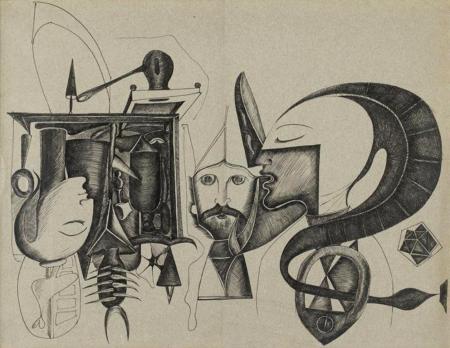
Victor Brauner
1938
_______________________
Poetry south of the Antilles
Peter Riley on Caribbean poets
fortnightly review
Turning to Caribbean poetry (though not all of these poets could be called "Caribbean") from the British zones I normally inhabit is in many ways a relief. There is a confidence of audience, a loss of psychological worry, political panic is replaced by political problems, and there is a sense of rich cultural resources across a wide range from village tales to contemporary poetry techniques. ...(more)
_______________________
10 for George
David Antin
presented by Jerome Rothenberg
1.
A young man has written a slim book of poems. He has sent the manuscript to an older poet whose poetry he admires. The older poet approves of the work and allows his approval to be printed in the book as a kind of preface. His name is Ezra Pound. It’s 1934. The country is in a deep depression. Publishers are hit badly and are not promoting books by newcomers. The young man takes things into his own hands. He lives in Red Hook, which is the source of many of the book’s oblique images. It’s a working class neighborhood. But there is no work. He goes from door to door trying to sell his book. He’s a handsome young man. He sells a few.
2.
George has an intermittent correspondence with Pound, who advises him to go to France and gives him addresses of people to see. George and Mary visit a few of these writers and then decide to try to get a look at the country outside of Paris. They rent a horse and wagon and travel the backcountry for several weeks. Their agricultural vocabulary in French is greatly expanded.
...(more)
_______________________
Anthony Burgess on James Joyce: the lost introduction
... it has to be regarded as a passport not only to Ulysses but also to Finnegans Wake. It presents the subsidiary cast of characters that are the small craft in the wake of Leopold Bloom’s odyssey; one of these characters, Martin Cunningham, appears in the dream fabric of Joyce’s last great book.
This new edition of Dubliners is not intended to satisfy a mere reading need. An important book sometimes requires the glory of embellishment through fine type, fine binding and fine illustrations. Such embellishment is a halo over its merit.
Whether Joyce would appreciate the adjunction of illustration is an open question. He, as a typical Dubliner, was brought up on music rather than pictures, and he did not wish his readers to see too much. His Dublin, both here and in the two bigger books, to say nothing of A Portrait of the Artist as a Young Man, is a city of sounds more than of appearances.
(....)
Dubliners was intended to perform the holy office of purgation: it was intended to be so exact a rendering of the life of Dublin that its citizens, appalled at the paralysis of thought and feeling in their city, would be purged of their faults and see in a work of art a machine for effecting a sort of spiritual regeneration. That makes the work a little too didactic, perhaps, and there was no author less didactic than Joyce. He makes no judgment; he merely demonstrates.
As a purge Dubliners seems fairly mild to us now, chiefly because it is the first in a pharmacopoeia of cathartics to which we have developed a tolerance. To its eponyms it seemed strong enough; it was not to be administered by the printers and publishers of Dublin, nor even of London or New York; its little saga of rejections, bowdlerisations and burnings looks forward to the epic struggle of Ulysses (itself originally conceived as a story for Dubliners) to reach the light and irritate its readers.
...(more)
_______________________
Art. Democratism. Propaganda.
Jonas Staal
e-flux 55
There is something deeply propagandistic in the disappearance of the notion of propaganda from artistic discourse. The word only resurfaces bluntly to dismiss certain practices as one-dimensional, as pamphletism, or as ideological and doctrinal. In our capitalist-democratic age, art is merely expected to “hold up mirrors,” to “ask questions,” and to show the ambiguities of our existence. As Hito Steyerl succinctly stated: “If contemporary art is the answer, the question is: How can capitalism be made more beautiful?”1 Art’s answer comes precisely in the form of a permanent critical questioning insulated from affecting the foundation of violent exploitation that sustains the capitalist-democratic doctrine.
The disappearance of the notion of propaganda is the result of a delicate ideological operation meant to obscure the fact that modern propaganda was developed by capitalist-democratic countries, rather than by so-called totalitarian ones. Our unwillingness to speak of art as propaganda proves the success of this operation. The Venice Biennale and its relation to the phenomenon of the world fair is a case study that could help us both understand the inherent propagandistic role of art in capitalist democracy, and reactivate our political relation to the practice of art in the realm of global politics.
...(more)
_______________________
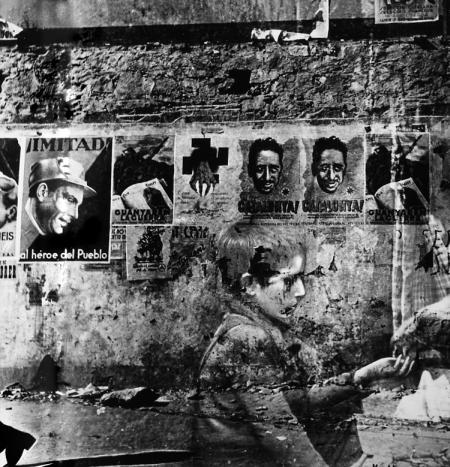
Niño
with wall
and posters
Kati Horna1937.
_______________________
Saving Privacy
Boston Review Forum
Opening the Debate
Framing surveillance as a tradeoff between privacy and security is a dead end for democracy.
Reed Hundt: (....)
The fundamental question of politics remains unchanged: Who rules? Does the alliance of big business and big government to control big information constitute a new and necessary form of control over society? Or does the promise of democracy still hold-are individuals still sovereign? If the latter, then businesses would have to remember that the customer is king. Government would be of the people, by the people, and for the people. And technology would not jeopardize the rights of individuals. Instead it would re-establish the Bill of Rights in the digital world.
No individual can muster the spending power of the big firms, much less the government. However, computer scientists have recently invented new ways for people to act alone or together, in private, outside the purview of business or government. The desire of the state and firms to know everything is on a collision course with the possibility that individuals can now engage with each other, in anonymous confidence, as never before.
What is needed is nothing less than a digital bill of rights that reinterprets the original amendments for this century. This document, like the original, will have to be negotiated. My purpose is to outline the three principles that I think should guide the negotiation: (1) substantial reduction of the secrecy that shrouds the sharing of information between firms and the government and constraints against government misuses of personal data, (2) purposeful encouragement of the attempts by individuals, acting alone or together, to use new technologies that assure privacy, and (3) commitment to due process of law as the method for exercising state and business power over information.
...(more)
|






































